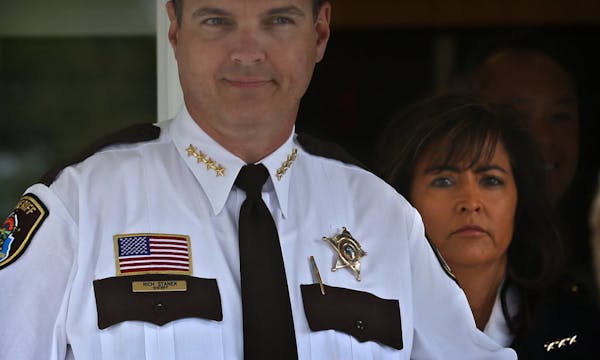A wave of retirements at police departments across Minnesota driven by a pension rule change is likely to exacerbate a shortage of officers in Minneapolis and other cities just as the summer crime season arrives.
Nearly one in five agency heads surveyed recently said the pension changes will cause major turmoil for their department.
In Minneapolis, where the number of sworn officers was already hovering near a 10-year low, the retirements have led to staffing problems in some precincts, according to union president Lt. John Delmonico.
"I heard the Second Precinct started the day shift today with three officers," he said Friday. The shift was fleshed out with officers called in on overtime, but the scramble points to the kinds of problems supervisors will face if crime ramps up as it typically does in summer, Delmonico said.
Out of about 10,500 peace officers in the state, an estimated 10 percent were eligible to retire before the pension law changes.
The change became law last year after it was contained in an omnibus pension bill meant to strengthen the police and fire plan of the Public Employees Retirement Association of Minnesota (PERA).
The pension change means officers who wanted to retire before they turn 55 would see smaller pension payments if they waited until after Saturday.
The law raised the financial penalty for early retirement from 1.2 percent per year to 5 percent per year for most members, a change to be phased in over five years.
However, members also have to consider that the longer they work, the more their salary is likely to increase and the more service credits they earn.
The impact of the PERA changes appears to vary greatly from department to department, said Andy Skoogman, executive director of the Minnesota Chiefs of Police Association.
In a recent survey of members, the organization found that almost 18 percent of the police chiefs who answered said that retirements due to the PERA changes are having a major immediate impact on their departments. About 19 percent said the impact was big but not as immediate. About 36 percent answered that it had some impact, and the rest said the issue didn't really apply to them.
Minneapolis force shrinks
About 27 Minneapolis officers retired this month, bringing the year's total so far to 40, said police spokesman Scott Seroka. At that pace, this could be the biggest year for retirements in at least a decade. The union said earlier this year that it sees an average of 30 retirements per year.
Some new officers are coming to Minneapolis, but due to training schedules, they won't be on patrol until this fall at the earliest.
A cadet class of 32 officers who have no former law enforcement experience will be ready to begin field training around Labor Day. A second class will open this fall for people who already have their Peace Officers Standards and Training license. If they get through the academy in two months, they could hit the streets by November.
"While the Minneapolis Police Department continues to train cadets and recruit candidates, we are also confident in our current staffing levels and our ability to respond to current call volumes … ." Seroka said Friday. "We also believe we will achieve our goal of hiring roughly 100 officers this year."
The department has City Council approval to staff the department to about 850 officers.
A recent city report said police response times had risen by about a minute on average for top-priority 911 calls, the first significant increase in at least five years. The slower response time was largely due to emergency dispatchers needing more time to find an available officer to handle the call.
Delmonico said he won't know for sure how many Minneapolis officers have left until Monday. He said he's asked the department to institute a fixed number of minimum officers for each shift, but believes it has adjusted its minimum staffing levels as the retirements accumulate.
The short-term solution is to bring in officers on overtime, and Seroka confirmed that it's one of the options being considered.
St. Paul's situation easier
Elsewhere, the retirements have caused fewer problems.
By this weekend, the St. Paul Police Department will have seen 21 retirements of sworn officers since the beginning of the year, said police spokesman Howie Padilla. That's compared to 23 retirements in all of last year and 16 in all of 2012. Police had previously said that there would be about 105 St. Paul officers that would be eligible for retirement.
The Ramsey County Sheriff's Office has had six retirements of sworn staff so far this year, the same number it had last year, said office spokesman Randy Gustafson. The sheriff's office said earlier that about 30 percent of its sworn deputies could have been eligible for retirement.
"Retirement is always such an individual decision, with factors of the individual's personal life, family ages, spouse retirement plans, job satisfaction, etc., it is difficult to really predict the numbers," Gustafson wrote in an e-mail.
Staff writer Nicole Norfleet contributed to this report. Matt McKinney • 612-217-1747

Taste of Minnesota to be enjoyed on the ground and in the air this year

Ex-Hennepin sheriff paid for drunk-driving damages with workers' comp

Souhan: This is KAT's chance to prove Flip Saunders was right

